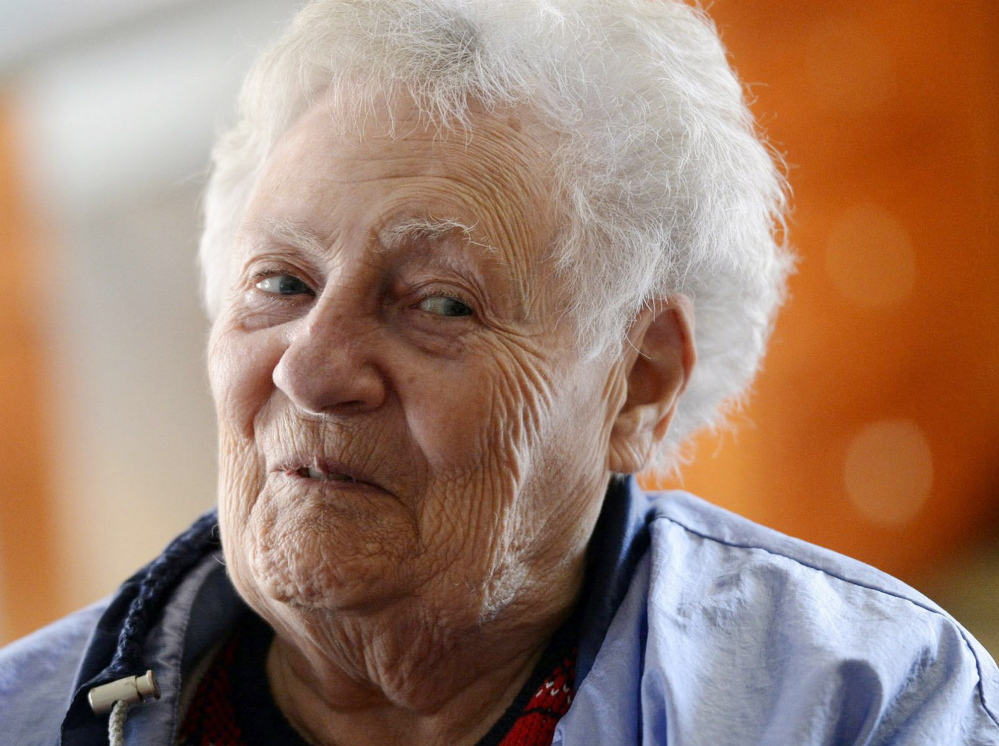Dawn Ducharme, a retired bookkeeper formerly of Saco, died Sept. 5 after battling dementia for three years. She was 82.
Mrs. Ducharme, who once had a sharp sense of humor and played cards every weekend, was the focus of a story in the Portland Press Herald/Maine Sunday Telegram series “The Challenge of Our Age” published two years ago.
“She’s in a better place,” her daughter, Liz Havu, said in an interview Friday. “It’s been a long road.”
Life came to a standstill on Aug. 14, 2012 – the day Mrs. Ducharme was diagnosed with vascular dementia and Alzheimer’s disease. At the time, she had been living with her daughter’s family in Hollis for more than a decade.
As the news story revealed, the signs of her illness were everywhere.
“She was putting dirty dishes into the cupboards as if they had been cleaned. She was leaving the front door wide open. A career bookkeeper, she was writing bad checks and had signed up for three life insurance policies,” reporter Leslie Bridgers wrote in the story.
The most alarming sign came when Mrs. Ducharme drove her car into a ditch. It prompted Havu to take her mother for a geriatric assessment. Three months later, Havu’s suspicions were confirmed and life as they knew it had changed forever. Havu and her husband, Dwight, put their lives on hold to take care of her.
“The first year wasn’t too bad,” her daughter said. “When it got to the point where she filled the house with propane for the second time, we had to hide the knobs on the stove. It was all about safety. In the last year, it got really hard. I had to dress her and wash her. I was able to do those things to keep her dignity. She really had her dignity till the end.”
Mrs. Ducharme and her late husband, Robert, were married for 45 years. They lived in Saco and raised two children. Mrs. Ducharme worked as a bookkeeper at the family business, Briggs Oil Service, for more than 20 years. After the business closed, she went to work for Pete’s True Value Hardware, Norstar Bank and Steego Auto Parts as a bookkeeper. In her later years, she was a temp secretary at the University of New England College of Osteopathic Medicine, and worked as a deli clerk at Hannaford in Saco. She retired in 1993.
“She was meticulous,” Havu said of her mother’s work. “When it came to bookkeeping, she was good. That was one of the clues we used to figure out something was wrong. Her checks started bouncing. She never bounced checks. It was unheard of.”
Mrs. Ducharme was remembered by her family Friday as a quiet yet strong-willed woman who wasn’t afraid to express her opinion. Havu said she had a sharp sense of humor. She chuckled recalling some of her mother’s funny yet inappropriate one-liners.
“She came out with these things – like where did that come from? She was opinionated, very much so,” Havu said. “If she didn’t like you, she didn’t like you. If she did, she would give you the shirt off her back. For her, family came first.”
Mrs. Ducharme and her husband enjoyed square-dancing, playing cards and traveling. Another highlight of her life was spending winters in Florida and summers at her family camp on Sebago Lake in Casco.
“Every weekend in the summer, us and my grandparents would go to the lake,” said her grandson James Havu. “She would go down and sit by the water. She loved the loons and picking raspberries.”
Mrs. Ducharme also had a passion for knitting. Liz Havu said her mother would knit sweaters, hats and mittens for family and friends. She often donated items to Southern Maine Medical Center.
As her dementia progressed, Mrs. Ducharme tried as best she could to continue doing the things that brought her joy in life. Some days were better than others.
For Liz Havu, the process of caring for her mother was both emotionally and financially draining. Even so, Havu put her life on hold to take care of Mrs. Ducharme, and fulfilled her promise not to put her in a nursing home.
“She hasn’t been able to do the things she loved for almost two years now,” Havu said. “She’s in a better place. For me and my husband, I feel free. We have our lives back. … The day she died, my friends came and cooked us dinner. We went out and had a campfire. We have a tradition of burning notebooks on Labor Day. I burned her caregiver log. It was healing. I don’t have to do this anymore. I can let go.”
Send questions/comments to the editors.



